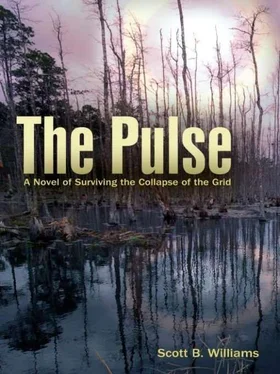Scott B. Williams
THE PULSE
A Novel of Surviving the Collapse of the Grid
For Jasmine,
for being the daughter I always wanted.
ARTIE DRAGER WAS MISERABLE. He was wet, cold, and seasick, and he could not remember ever wanting anything in life as much as he wanted to be back on dry land. He huddled in the open cockpit against the back of the main cabin bulkhead to get some shelter from the wind and spray and stared at the glow of the GPS chartplotter that showed course and distance to landfall. There would be no getting off this boat ride for at least 30 to 36 hours, if the ETA displayed in a corner of the screen was to be believed.
Artie could not escape the constant sound of the crashing waves that lifted and tossed the small schooner as she shouldered her way through them in the darkness, driven onward by 20 knots of steady trade winds filling her sails. The noise and motion assaulted every part of his being, making rest impossible. He marveled that his brother could be sleeping soundly in his bunk down below, oblivious to the roaring water and horrid pitching and rolling. But Larry was a sailor, while Artie knew now, if he had not known it before this passage, that he most definitely was not. Though he was cold and tired of getting drenched with salt spray whenever the bow crashed into a larger-than-average wave, Artie knew he couldn’t go below even when it was Larry’s turn to come on deck for his watch. Being down there in the confines of the dark teak cabin just made his seasickness worse, and each time he had tried it he had rushed back up the companionway to spew over the rail. By now there was little left in his stomach and he didn’t want to think about eating more.
The queasiness had begun just hours after they’d sailed out of the anchorage near Fort-de-France and dropped Martinique astern for an offshore passage to St. Thomas. Artie had had high expectations at the start; it seemed like a fantastic idea for a much-needed vacation—a quick trip to the Caribbean to help his adventurous younger brother on an exciting yacht delivery job, sailing a gorgeous wooden schooner to her new owner. Larry did this for a living, and he had assured Artie that this would be a short, easy run. But Artie had never sailed offshore, and he hadn’t counted on the seasickness. If not for that, it would have been great. Ibis was a beautiful little ship, and well set up for ocean voyaging.
The electronic autopilot connected to the wheel and controlled by the computer in the GPS did an excellent job of keeping the 45-footer on course. While taking his turn on watch, Artie really didn’t have much to do other than scan the horizon every fifteen or twenty minutes to look for the lights of ships or other vessels that might be dangerously close. So far there had been none. Artie stood again and checked through a full 360 degrees for any flicker of light over the crests of the dark waves. There was nothing he could discern, especially through the light rain that was falling, further obscuring the night sea and adding to the discomfort he already felt from the spray. Artie would not have believed it possible to feel cold in these tropical latitudes, but being out in the wet and windy night for hours had him shivering. He looked forward to the return of daylight when the sea would seem warmer and much less menacing.
He sat back down on the cockpit seat and pushed buttons on the GPS, zooming the electronic chart out to where he could see the big picture, showing the boat-shaped blip that indicated the schooner’s position in relation to all the other islands of the eastern Caribbean from Trinidad to Puerto Rico. Their destination was a waypoint Larry had selected at a channel marker outside the anchorage at Charlotte Amalie, in St. Thomas. An average speed of around eight knots made their progress to the waypoint seem excruciatingly slow to Artie, who had never traveled any distance at such painstaking speeds, but he took comfort in the fact that at least they were well over halfway through the passage. Staring at the seemingly stationary blip on the chart was somewhat depressing, though, so he huddled back against the bulkhead and pulled the hood of his foul-weather jacket back over his head, unzipping the front so he could get to his Blackberry phone, sealed in a Ziploc bag in one of the inside pockets. Through the plastic, he pushed the buttons to power it up and scroll through the text messages to the last one he had composed to Casey.
He had written dozens of such messages, each time pressing the SEND button when he was done, though he knew there was no point as long as they were this far offshore, well beyond the reach of any cell phone towers. But it gave him something to do when he wasn’t hanging his head over the rail and puking, and it made him feel closer to her even though he knew she wouldn’t get any of his texts until they made landfall and the phone could reconnect to the network.
Text messaging was his lifeline to Casey. Artie had just learned how to do it five years ago when he was 42 and Casey, at 14, began using her first cell phone. He had quickly learned that phone calls were passé these days, at least among teenage girls. Even now, when she was in her second year of college, Artie found it much easier to reach Casey by text than any other means, so he’d grown used to it and did a passable job of typing with two thumbs on the tiny keyboard. He wrote to tell her what it was like out on the ocean at night, how sick he felt most of the time, and how glad he would be when they finally disembarked at St. Thomas. Writing made him feel closer to her. He wondered what she might be doing at that particular moment, hoping that at this hour she was sleeping safely in her shared apartment near campus. He ended his latest message by reminding her how much he loved her and telling her he couldn’t wait to spend a weekend with her after he got back home.
After he put the phone away he was drawn again to the irresistible glow of the chartplotter screen, even though he really didn’t want to know that they had only covered about three miles in the last twenty minutes. Artie checked the time on the screen and saw that his watch would be over in just one more hour. The GPS had a built-in XM satellite radio receiver, so to kill time, Artie turned it on and tuned back to a blues station he’d been listening to earlier. He turned the volume up just enough to hear the wail of bending guitar strings over the endless crash of water, but not so loud that Larry would hear it down below. Artie thought it was great that they could pick up any kind of music or news they wanted out here beyond the sight of land, and he wished his Blackberry were likewise satellite-enabled. Maybe someday soon, all cell phones will be , he mused.
He stood to scan the horizon again, bracing himself with one hand on the steering pedestal to keep his balance as the long, narrow hull plunged into the troughs and cut through the crests of the endless waves that marched across their course at nearly a 90-degree angle. The rhythmic motion seemed to be in sync with the Memphis blues emanating from the waterproof speakers that filled the cockpit with sound. The music reminded Artie of his home near New Orleans as he hung on and looked out into the darkness, still searching for ships that were not there. At least the rain had quit again, and the sky was starting to clear up. He could once again see the North Star hanging low on the horizon almost directly ahead on the course they were sailing. He was staring at it and thinking about Larry telling him that if you measured the angle of this star (Larry called it Polaris) above the horizon, that number of degrees would correspond to your exact latitude north of the Equator. Down here in these “little latitudes,” as Larry’s favorite singer, Jimmy Buffett, described them, those numbers were in the teens. Right now, according the GPS, Ibis was located about halfway between 16 and 17 degrees north. Artie looked back at the pole star and stretched his arm out in front of him, “measuring” with his thumb and forefinger. It was indeed a low angle, and that looked about right.
Читать дальше












